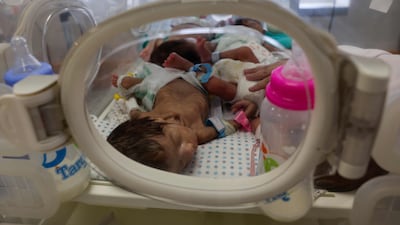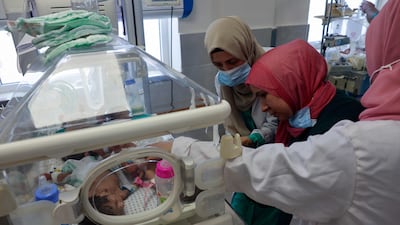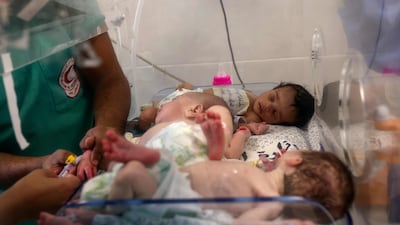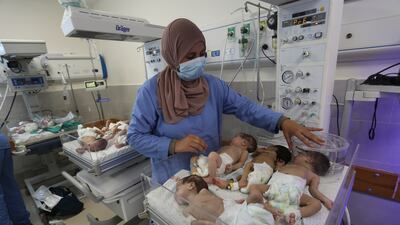Live updates: Follow the latest on Israel-Gaza
Thirty-one premature babies have been evacuated from Gaza's largest hospital as their lives hang in the balance, with all major healthcare complexes in Gaza city now out of service.
The infants were evacuated from Al Shifa Hospital in co-ordination with the UN, the Palestinian Red Crescent said.
The babies, most of whom are now orphans, have been sent south in ambulances to be treated at the Emirati Hospital in Rafah, representative Nebal Farsakh confirmed to The National.
The children were wrapped in tinfoil to stay warm in the absence of incubators, she said.
“There are no parents for them. Those who have parents were forced to leave the hospital in recent days and many of them lost their parents during the bombardments,” she added.
The plight of the newborns has captured international attention amid mounting odds of survival in Gaza, where the humanitarian and security situation remains dire.
Doctors now say none of the city's hospitals are functioning.
“All of Gaza city's hospitals are out of service, and only two small hospitals remain,” said Dr Mohammed Zaqout, Director General of Gaza's hospitals.
Infants were near hot water and each other for warmth as emergency generators shut down in Al Shifa last weekend, leaving their incubators without power.
Several babies died as a result of the power cuts.
Baby food and formula were unavailable, said Ms Farsakh, who said the Red Crescent expected to be able to remove more babies.
“One baby lost his life last night, and another one early this morning, so when we arrived there were only 31 babies.”
Six medical staff and their families accompanied the babies, she added.
Preparations have been made for the babies to be sent to Egypt, Dr Zaqout said on Sunday.
Doctors previously warned the lives of 80 premature babies across the enclave were at risk, with all expected to die if fuel was not allowed through the border crossing.
Al Shifa, in Gaza city, has been raided by Israeli forces several times over the past week, with Israel claiming Hamas has a command centre under the hospital.
The military confiscated weapons from the site, saying it had found arms and ammunition hidden behind MRI scanners, but did not provide evidence of a Hamas base at the complex.
The army said it provided baby food, medical supplies and incubators to the hospital.
“We do not lack incubators for newborn babies, but we lack safety and fuel, because of the Israeli occupying forces siege and fire on the hospital,” Dr Adnan Al Borsh, head of the orthopaedic department, said on Thursday.
A UN team led by World Health Organisation officials was permitted to visit Al Shifa on Saturday, touring the complex for one hour.
The WHO said about 300 people, including patients unable to walk, remained at the hospital despite renewed Israeli calls to leave the site, where officials saw a mass grave near the entrance.
This number includes babies in critical condition, it said.
It referred to the hospital as a “death zone”.
The situation remains dangerous across the entire Gaza Strip, Ms Farsakh said, even in the south.
More than 12,000 civilians are sheltering in its Al Amal Hospital in Khan Younis, which has had no power or water for seven days.
Others are forced to remain in the north, with sick, elderly and wounded relatives unable to walk the lengthy journey south. People have been forced to bury loved ones in their gardens.
“We have received dozens of phone calls for people who are trapped there … there's no way for them to walk five, six or seven hours. So the whole family members have to stay with them. These people shouldn't be left alone. We should not turn our back on them, with no hospitals or ambulances to help them.”







